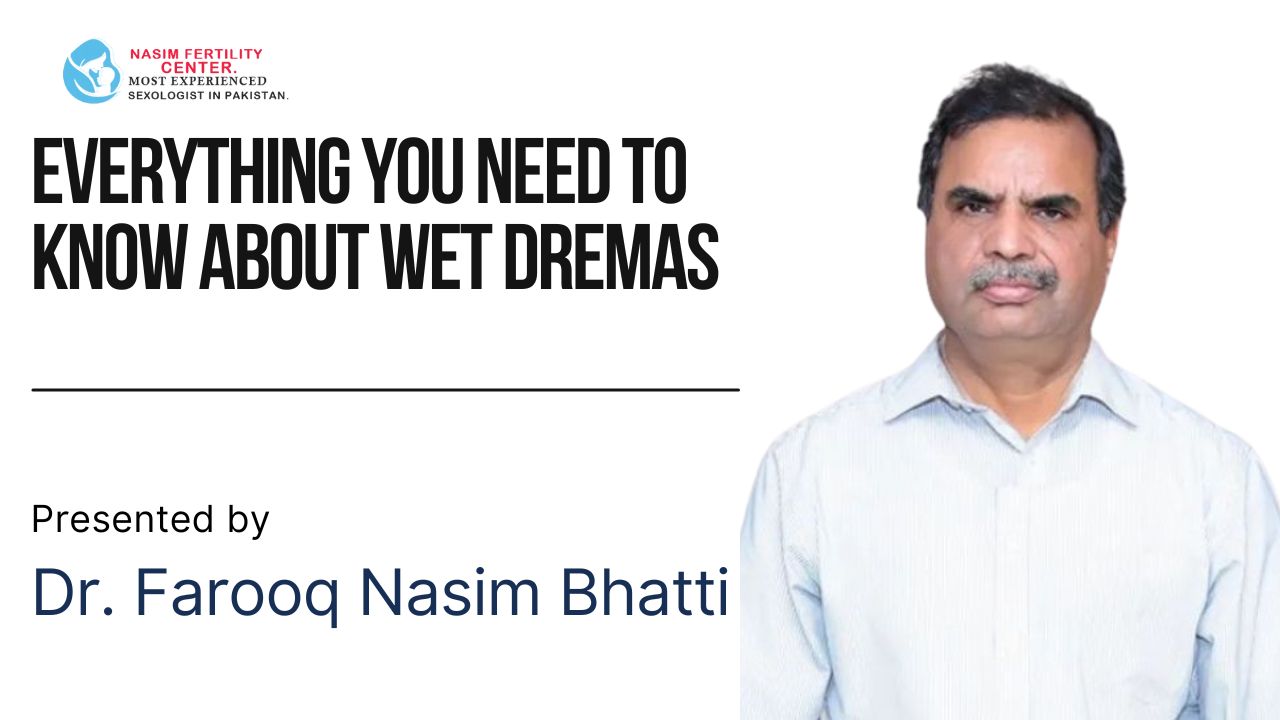
Wet dreams (Ehtelam, احتلام), scientifically referred to as nocturnal emissions or nighttime emissions, are a natural and common occurrence, especially among adolescents. While typically harmless, some individuals experience excessive wet dreams (Ehtelam, احتلام) that can lead to distress or concern.
In these cases, it’s helpful to understand possible treatments and when to seek expert guidance. Dr. Farooq Nasim Bhatti, a distinguished sexologist in Pakistan, provides specialized treatment for those experiencing excessive wet dreams (Ehtelam, احتلام), helping them regain control and peace of mind.
With nearly 31 years of experience, Dr. Farooq Nasim Bhatti Bhatti is Pakistan’s first and only recognized medical sexologist with extensive international certifications. He offers personalized care for those dealing with sexual dysfunction, and his approach is both comprehensive and compassionate.
What Are Wet Dreams?
Wet dreams (Ehtelam, احتلام), or nocturnal emissions, refer to involuntary ejaculation or orgasm that occurs during sleep, often accompanied by vivid or erotic dreams. Most commonly, wet dreams (Ehtelam, احتلام) are experienced by adolescent males due to hormonal changes that come with puberty. However, they are not limited to teenagers; they can also occur in adults. A wet dream (Ehtelam, احتلام) that occurs without pleasure and is associated with physical or sexual weakness indicates an abnormality and requires treatment.
Wet dreams (Ehtelam, احتلام) are a natural and normal part of male sexual development and can vary in frequency based on age, hormonal levels, and lifestyle factors, and are not associated with physical or sexual weakness.
Kya ap Ehtelam sy pryshan hyn?
Consult Dr. Farooq Nasim Bhatti Jo Pakistan ky Leading Sexologist & or Ehtelam ky Ilaj ky Mahir hyn.

Wet Dreams Meaning in Urdu
For individuals who may be more comfortable with Urdu, wet dream meaning in Urdu is expressed as “خواب میں انزال” (Khawab Mein Inzaal). Wet Dreams are also called Ehtelam. This directly translates to ejaculation during sleep without conscious involvement or arousal.
Are Wet Dreams Normal?
Yes, wet dreams (Ehtelam, احتلام) are entirely normal and are part of the body’s natural sexual functioning. They are particularly common among males between the ages of 12 and 18, with a significant decrease in frequency in adulthood. However, occasional wet dreams (Ehtelam, احتلام) in adulthood are also not a cause for concern.
What Causes Wet Dreams?
Wet dreams(Ehtelam, احتلام) are caused by a combination of physical, psychological, and hormonal factors:
- Hormonal Changes: Testosterone and other sex hormones increase during puberty, which often triggers physical arousal even without conscious awareness.
- Erotic Dreams: Sometimes, sexual dreams during sleep can stimulate the brain and body, leading to ejaculation.
- Sexual Abstinence: Those who abstain from sexual activities for an extended period may experience more frequent wet dreams (Ehtelam, احتلام) as the body releases built-up sexual tension.
Note: Wet dreams are involuntary, and the body manages them as a way of releasing sexual tension or surplus sperm cells.
What to Do if You Have a Wet Dream
Wet dreams (Ehtelam, احتلام) generally do not require any action or treatment. However, individuals may find it helpful to:
- Maintain Hygiene: Take a shower and change clothing or bed sheets to maintain cleanliness.
- Understand the Process: Educating oneself about wet dreams (Ehtelam, احتلام) can reduce anxiety or embarrassment.
- Seek Guidance if Distressed: If frequent wet dreams (Ehtelam, احتلام) are causing distress, physical or sexual weakness, seeking help from a specialist like Dr. Farooq Nasim Bhatti can be beneficial.
Myths and Facts About Wet Dreams (Ehtelam, احتلام)
Common Myths:
- Myth: Wet dreams (Ehtelam, احتلام) only occur in men.
- Fact: Although more common in men, women can experience orgasms during sleep as well.
- Myth: Wet dreams (Ehtelam, احتلام) indicate dissatisfaction in personal life.
- Fact: Frequency varies based on hormones and other factors, not necessarily personal satisfaction.
When Do Wet Dreams (Ehtelam, احتلام) Start and Stop?
Wet dreams (Ehtelam, احتلام) typically start around puberty, between the ages of 12 and 16, when hormonal levels are high. For many, they naturally decrease in frequency by their 20s, though some adults may continue to experience them periodically.
When do wet dreams (Ehtelam, احتلام) require treatment?
Treatment for Excessive Wet Dreams (Ehtelam, احتلام)
Excessive wet dreams (Ehtelam, احتلام), particularly in adulthood, can be distressing, especially when Ehtelam (wet dreams) occur without pleasure and are associated with physical or sexual weakness. Frequent nighttime emissions may disrupt sleep or lead to feelings of embarrassment, which can impact mental health and weak sexual health. Here’s where expert guidance is essential.
Dr. Farooq Nasim Bhatti’s Approach to Treating Excessive Wet Dreams (Ehtelam, احتلام)
With his expertise in sexual health, Dr. Farooq Nasim Bhatti provides personalized treatment strategies for those experiencing excessive wet dreams (Ehtelam, احتلام). His approach includes:
- Individual Assessment: Understanding the patient’s lifestyle, hormone levels, mental health, and any underlying concerns.
- Lifestyle Adjustments: Recommendations for sleep hygiene, diet, and exercise that may reduce the frequency of wet dreams (Ehtelam, احتلام).
- Cognitive Behavioral Therapy (CBT): Helping patients manage any anxiety or stress contributing to excessive wet dreams (Ehtelam, احتلام).
- Hormonal Evaluation and Management: In cases where hormonal imbalances may be a factor, Dr. Bhatti can offer hormone-level assessments.
- Medication: When necessary, mild medications or supplements may be prescribed to help manage hormonal levels or reduce arousal.
By addressing both the physical and psychological aspects of excessive wet dreams (Ehtelam, احتلام), Dr. Farooq Nasim Bhatti offers a well-rounded treatment that is compassionate, effective, and rooted in medical expertise.
Preventing Wet Dreams: Practical Tips
While completely preventing wet dreams (Ehtelam, احتلام) is unlikely, certain strategies may help reduce their frequency:
- Stress Management: Practicing relaxation techniques like meditation can help manage anxiety and promote restful sleep.
- Balanced Diet: Avoid stimulants before bed, as caffeine and sugar can increase vivid dreams and disturb sleep patterns.
- Regular Exercise: Physical activity helps balance hormones and may reduce overall sexual tension.
- Sleep Hygiene: Going to bed at a regular time and creating a calming pre-sleep routine can improve sleep quality.
Why Choose Dr. Farooq Nasim Bhatti for Excessive Wet Dreams Treatment?
Dr. Farooq Nasim Bhatti stands out as Pakistan’s leading expert in sexual health, holding prestigious credentials:
- Pakistan’s Only Diplomate of the American Board of Sexology (USA), with comprehensive training in sexual dysfunction and reproductive health.
- MBBS, FAACS-Certified, with over 31 years of clinical experience in treating sexual dysfunction and nocturnal emissions.
- Extensive Research: Dr. Farooq Nasim Bhatti has presented (more than 20) research papers on the treatment of sexual disorders at international conferences held in Germany, the USA, Turkey, Singapore, South Korea, Hong Kong, Malaysia, India, and Spain, where his work has been highly appreciated. These research papers can be read here.
- Customized Treatment Plans: Dr. Bhatti believes in tailored solutions that address the unique needs and circumstances of each patient.
- Compassionate Care: His compassionate, patient-centered approach ensures that individuals feel supported, respected, and empowered.
For individuals experiencing excessive wet dreams (Ehtelam, احتلام) or related concerns, Dr. Farooq Nasim Bhatti provides expert guidance, effective treatment plans, and reassurance in a safe, confidential environment.
Frequently Asked Questions
Can wet dreams be controlled?
Wet dreams (Ehtelam, احتلام) are largely involuntary, but lifestyle adjustments can help reduce their frequency.
Is it normal to feel anxious about having wet dreams?
Yes, particularly for adolescents experiencing them for the first time. Education can help alleviate these concerns.
Do wet dreams indicate something wrong with my health?
No, wet dreams are a natural bodily process and generally do not indicate any health issues.
How can Dr. Farooq Nasim Bhatti help me with excessive wet dreams?
Dr. Farooq Nasim Bhatti provides expert advice, lifestyle guidance, and, when necessary, medical interventions to help manage excessive wet dreams.
Conclusion
Wet dreams (Ehtelam, احتلام) are a common, natural experience, particularly during puberty, and generally decrease with age. Understanding the causes and myths surrounding nocturnal emissions can help individuals feel more at ease with this part of sexual health.
For those experiencing excessive wet dreams (Ehtelam, احتلام) that impact daily life, Dr. Farooq Nasim Bhatti’s extensive experience in sexual health makes him an ideal choice for personalized treatment. Through a combination of lifestyle changes, medical guidance, and compassionate care, Dr. Bhatti empowers his patients to live healthier, more comfortable lives.
Disclaimer
This information is for educational purposes and not the treatment. For treatment, you need to consult the doctor.

Dr. Farooq Nasim Bhatti (MBBS, FAACS – USA, Diplomate: American Board of Sexology, CST, HSC – Hong Kong, CART – Malaysia & China) is a qualified medical sexologist with 30+ years of experience. He has presented 21+ research papers internationally and treats sexual dysfunction through sex therapy, counseling, and pharmacotherapy to restore natural sexual function without temporary medication.

Regain Confidence with Our ED Solutions
Explore effective treatments for erectile dysfunction. Take charge of your intimacy today.


